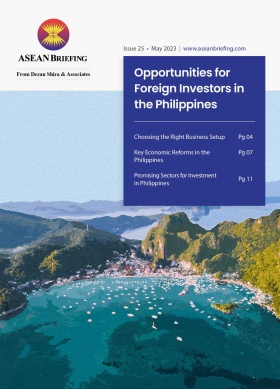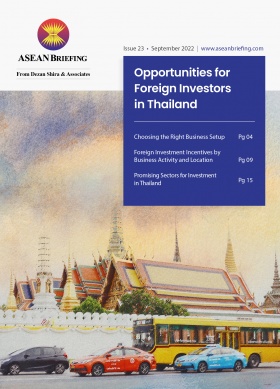Thailand Issues New Investor Visa for Eastern Economic Corridor
Thailand’s Eastern Economic Corridor (EEC) has issued a new investor visa in a bid to boost foreign investments in targeted industries. The new visa scheme will be implemented on January 1, 2024.
The new EEC visas are categorized into four types:
- Specialists: EEC Visa “S”
- Executives: EEC Visa “E”
- Professionals: EEC Visa “P”
- Spouses and dependents: EEC Visa “O”
Companies in these targeted industries will receive a new investor visa with a maximum duration of 10 years, which will be linked to the applicant’s employment contract. In addition, these visa holders will have an automatic issuance of the EEC work permit, be eligible for a 17 percent flat income tax rate, and have a dedicated fast-track channel at international airports in Thailand.
The EEC straddles three eastern provinces of Thailand – Chonburi, Rayong, and Chachoengsao – off the coast of the Gulf of Thailand and spans more than 13,000 square kilometers.The EEC’s five-year development plan
Thailand’s Eastern Economic Corridor Policy Committee has just approved its latest five-year development plan for 2023-2027.
For 2023-2027, the EEC has set an investment target of 500 billion baht (US$13.7 billion) over the next five years. The development plan focuses on targeting promoted industries, upskilling the workforce, ensuring sustainable community development, and developing modern cities.
The framework of the EEC is specifically designed to accommodate Thailand’s 10 target industries and its ‘Thailand 4.0 initiative’ to attract foreign investment. The 10 target industries include five existing industries: Automotive, electronics, petrochemical, agriculture and food, and tourism as well as five new next-generation industries: Automation and robotics, aerospace, digital, biotechnology, and medical and healthcare.
Between 2018-2022, the EEC attracted approximately 1.8 trillion baht (US$49.3 billion), exceeding the 1.7 trillion baht (US$46.6 billion) target.
Investment opportunities in Thailand
As the second-largest economy in Southeast Asia behind Indonesia, Thailand presents ample investment opportunities for foreign businesses. The country has experienced growing domestic consumption over the decades coupled with robust export-oriented manufacturing, resulting in the country gaining the status of an upper-middle-income nation in 2011.
Value added manufacturing
Thailand’s economy is dependent on exports, which accounted for some 60 percent of GDP before the pandemic. As such, the country’s manufacturing sector plays an important role, contributing 27 percent of GDP in 2021; the sector’s success or failure often dictates the economy’s overall health.
Over the last 50 years, Thailand has built up a robust manufacturing sector. It is now keen to attract investments for mid/high-tech manufacturing, especially as regional rivals like Vietnam and Cambodia become new centers for low-cost production in the region.
Medical tourism
Thailand earned US$1.8 billion from over four million medical tourists in 2019, which amounted to three percent of the GDP and was projected to reach 3.5 percent until the pandemic struck. The country served clients mainly from the US, the Middle East, and Europe.
Medical treatments can be lower by up to 30 percent compared to the West, and healthcare quality is comparable to leading hospitals worldwide. The Thai medical tourism industry is projected to have a market value of US$24.4 billion by 2027.Halal food manufacturing
Despite being a Muslim minority country, Thailand is the 12th largest global exporter of Halal products and the fifth largest producer of Halal foods. Halal food accounts for 20 percent of Thailand’s total food exports, with 60 percent of its exports going to the Muslim-dominated countries of Indonesia, Malaysia, and Brunei. As such, the country is well-placed to be a hub for Halal F&B manufacturing in the region.
Thailand has met several key strategies in the Halal food industry, such as its increasing capacity in Halal certification and formulation and upgrading its research and development.
Conclusion
Overall, Thailand’s EEC and broader investment landscape present promising opportunities for foreign businesses seeking growth, innovation, and strategic market expansion in Southeast Asia.
About Us
ASEAN Briefing is produced by Dezan Shira & Associates. The firm assists foreign investors throughout Asia and maintains offices throughout ASEAN, including in Singapore, Hanoi, Ho Chi Minh City, and Da Nang in Vietnam, in addition to Jakarta, in Indonesia. We also have partner firms in Malaysia, the Philippines, and Thailand as well as our practices in China and India. Please contact us at asean@dezshira.com or visit our website at www.dezshira.com.







